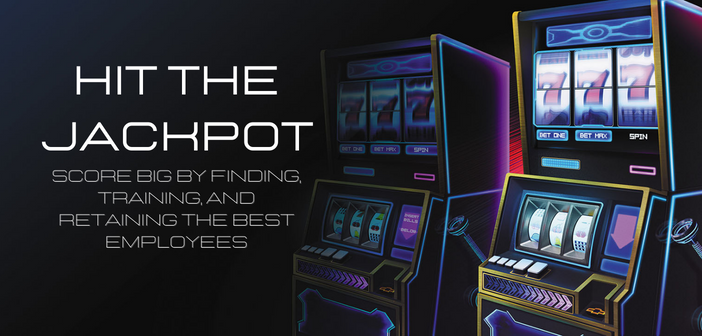Score big by finding, training, and retaining the best employees
As numerous reports have shown – and many hoteliers can attest from personal experience – the hospitality industry is facing built-up demand from people across the world who have been unable to travel due to self-imposed quarantine, government restrictions, event cancellations, and overall health safety, all tied to the pandemic. To accommodate this influx of travelers, hotel owners and operators are scrambling to fill vacant positions at their properties all in the name of providing excellent customer experiences for their guests.
Accordingly, hoteliers are working hard to find, train, and retain the very best staff members possible, but given persistent shortages in the American workforce – which is affecting hotels and restaurants disproportionately – it’s hard enough keeping staffing levels adequate, much less finding the very best people to fill the vacant positions.
This issue of Today’s Hotelier is dedicated to workforce issues, and in this article, we explore three key components necessary to build a strong team – hiring, training, firing – and examine strategies and techniques needed throughout the process to find, and keep, the best team possible.
Key #1 Hiring

PRESSMASTER/SHUTTERSTOCK.COM
Many hotel owners don’t have a human resources department to assist with the hiring process. Often, owners and managers are the ones emailing and interviewing candidates, and organizing all the new-hire paperwork.
Hiring starts with advertising the position and finding quality candidates. According to a 2022 HubSpot study, 80% of all job searches are conducted online and roughly 85% of all jobs filled are accomplished via networking. So, what are some green flags of the hiring process that owners and operators can use as a guide?
MULTIPLIER: LEVERAGE YOUR NETWORK
Networking is a huge part of the job hunt and hospitality professionals can do this by promoting current job openings on their LinkedIn, Facebook, or other social media accounts. An estimated 48% of Gen Z and Millennials with work experience have applied to job opportunities they found on social media.
MULTIPLIER: BOOST YOUR RESPONSE TIME
The hospitality industry can be fast-paced, especially during peak travel seasons. According to the U.S. Bureau of Labor Statistics, there were nearly two million job openings in the hospitality industry in 2021. To remain competitive, response times for quality candidates need to be quick.
MULTIPLIER: BE TRANSPARENT ABOUT RESPONSIBILITIES AND PAY
Some hotel owners may think it’s hard enough getting good candidates in the door, so why scare them off with a prescreen call? This pre-screen phone call can end up saving you and the candidate a lot of time if the role isn’t a good fit for the candidate. It also reduces turnover caused by someone accepting a role while not fully understanding the expectations.
In the pre-screen call, it’s important to be transparent about exactly what the responsibilities of the role are, along with the pay/salary. Studies show that Gen Z and Millennials support pay transparency, and when an employer is upfront and honest these applicants are more likely to respect the employer.
Red flags during the hiring process
- Lack of passion for the role/industry
- Ambiguous responses to basic questions
- Poor communication skills
- Unwilling to share availability
Key #2 Training
Let’s say you found the perfect candidate and are ready to bring them on board. How can you ensure this new employee not only stays for the long term but becomes an advocate for your business while providing excellent customer service to guests?

PRESSMASTER/SHUTTERSTOCK.COM
A huge part of employee retention is the onboarding and training process. A passionate, motivated candidate will be open to learning new things, but it’s your job to ensure the candidate has the right tools and resources that set them up for success.
MULTIPLIER: THE BUDDY SYSTEM
When you’ve hired a new candidate, it’s helpful to pair them with a high-performing employee they can refer to as a mentor and resource. New candidates often feel timid asking their boss simple questions. But, by pairing newer hires with a more-tenured employee, those new team members will be more encouraged to ask questions and pick up best practices.
MULTIPLIER: SELF-PACED TRAINING
It’s important to realize that everyone learns at a different pace and in a different way. Be sure to offer your new candidate enough time to continue learning about their responsibilities. A good analogy for this is like peeling an onion. When you throw all the responsibilities at a new candidate, they may find it difficult to digest. However, they’re more likely to retain the information and make fewer mistakes if you peel the layers and teach them the responsibilities in a sequential, cohesive manner.
MULTIPLIER: INSPIRING CREATIVITY
When you hire a new candidate, you’re in a unique position to learn about your business and processes from a new perspective. Allowing new hires to feel ownership over their role and that they have a voice that’s being heard will improve your operational processes. These situations often can lead to creative problem solving in a way you hadn’t considered before.
Red flags during the onboarding process
- New candidate is not asking questions
- Unmotivated to learn
- Dismissive to customers/guests and/or fellow team members
- Shows up late multiple times for training
Key #3 Firing
In recent months, we’ve seen well-known brands lay off thousands of employees through text messages. Being a business owner has a lot of benefits, but there certainly are some not-so-fun aspects of the job – including firing an employee. Human resource professionals get specifically trained on how to fire someone with dignity and managers/owners can apply those best practices to their own businesses.

BARANQ/SHUTTERSTOCK.COM
MULTIPLIER: DON’T BURN BRIDGES
Whether your employee has been with you for a day or a year, it’s important to give your employees the same level of customer service you provide your guests. Have an open conversation with the employee and being understanding that the hospitality industry relies heavily on word-of-mouth. One upset employee can make it difficult for you to hire new employees.
MULTIPLIER: BE CONCISE
State the reason for the firing so your employee isn’t left feeling confused and betrayed. Whether it’s due to budget cuts or a behavioral issue, being clear and concise with a concrete reason for the firing is an effective way to approach a tough situation.
MULTIPLIER: ENSURE YOUR ACTIONS ARE LEGAL
Some hotel owners sign contracts with their employees, so you’ll want to double check that you aren’t violating any of these types of agreements. You’ll also want to ask yourself if the reason for the firing is legal and valid. Consulting a lawyer may be helpful if you aren’t clear on the reasoning or the reasoning can fall under the laws of discrimination.
Red flags during the firing process
- Not having a concrete reason for firing
- Handling a firing via text, phone call, or other impersonal method
- Keeping an underperforming worker to avoid an uncomfortable confrontation
- Failing to examine a firing’s legality beforehand
What went wrong?
Now that we’ve covered some best practices and red flags of the hiring, training, and firing process, let’s look at a sample scenario to see if we can spot the avoidable mistakes. You’ve already checked out the rest of this article, right? No skipping ahead!

GARAGESTOCK/SHUTTERSTOCK.COM
OK, grab your partner and/or manager and discuss what could have been done differently in this case study.
Case Study: An experienced motel owner was in need of qualified individuals as part of his or her housekeeping staff. The owner had two locations and needed someone who could switch shifts between both locations. The owner decided to interview candidates and made a list of questions to ask.
- Question 1: What is your pay/salary expectation?
- Question 2: Do you have any hospitality work experience?
- Question 3: What’s your favorite part of your day?
After the interview process, the owner decided this was the right candidate. Although the candidate didn’t have hospitality experience, the candidate had experience cleaning houses for more than two years. The owner and candidate agreed on a start date and decided no training was required since the candidate was accustomed to cleaning homes.
After one week on the job, the candidate decided to quit. The owner was puzzled by this because the candidate seemed enthusiastic during the interview. Later, the owner learned that the candidate didn’t have a reliable car, which made it difficult to travel between the two motel locations. He also learned that although the candidate was experienced in house cleaning, the candidate would often forget to refill/replace the toiletries.
What could this owner have done differently?
CUSTOMER SERVICE = EMPLOYEE SERVICE
Hoteliers share many differences, but one commonality across the industry is the recognition of the need for excellent customer service. Until something drastic changes the dynamic, your team members are the ones directly responsible for creating a great experience for your guests. If those team members are unhappy and/or underperforming, you will lose business, and you will lose other employees as the well is poisoned. Fortunately, treating employees with dignity and respect, and giving them the tools they need to succeed, will set them, you, and your business up for growth and ensure you are retaining quality staff members for years to come.




